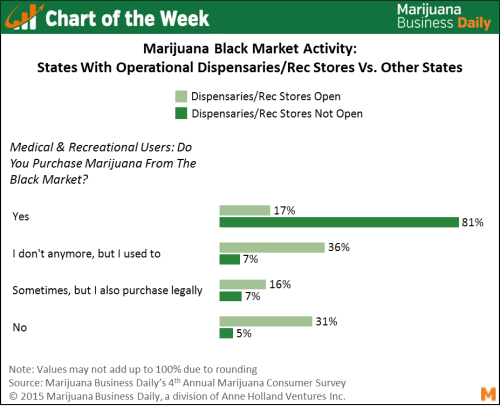This article has reopened the discussion about the degree to which alcohol and cannabis are complementary or substitutes.
Alcohol sales get higher after weed legalization contrary to industry fears
But a few years into Colorado legalization, alcohol sales are up in the state, and those in the alcohol business have embraced their fellow industry.
In the 18 months since recreational sales were legalized in Colorado, “we’ve just seen phenomenal growthâ€, said Justin Martz, 32, who runs Mr B’s Wine & Spirits in downtown Denver. He noted that there was some concern initially about legalization, “but it’s really turned out to be a non-issueâ€. In fact, he said, “if anything it’s kind of helped us. A high tide lifts all boats.â€
Bryan Simpson, spokesman for the Fort Collins craft brewery New Belgium, agreed that doomsayers in the alcohol industry were wrong. He argued that rather than alcohol and pot directly competing against one another for consumers’ dollars, the two can be mutually beneficial in boosting overall sales. […]
Part of the reason for the alcohol and marijuana industries’ success may be a boost in Colorado tourism. Though some state officials insist marijuana is not attracting new visitors, Colorado tourism set record highs in 2014, the first year of legalization, with 71.3 million visitors who collectively spent $18.6bn.
Many in the alcohol industry credit marijuana with helping boost tourism.
Of course, while the alcohol and cannabis industries may be happy with this apparent trend, it’s a real concern to the government paternalists who have, in the past, clearly expressed their willingness to throw casual users under the bus in an attempt to prevent problem drinking.
Mark A.R. Kleiman: @mrclay_org Either way, not good news. If cannabis were a substitute for alcohol, legalization would have been a lay-down.
No such luck.
[…]
Mark A.R. Kleiman: If cannabis and alcohol aren’t substitutes, “pot is safer than booze” is only a weak argument for legalization. https://t.co/XKKQOVr19b
[…]
Mark A.R. Kleiman: @CaliforniaNORML
Foolish alcohol policies expose users and others to grave risk.
So in fairness we should do the same with weed.
Srsly?
Of course, this article still doesn’t answer the question related to whether pot and alcohol are complementary or substitutes (and to what degree, or by what populations).
Ultimately, to me, it doesn’t matter.
I simply cannot and will not accept the notion of paternalistic government that punishes large segments of the population in a misguided attempt to prevent a small group of people from harming themselves. It’s arrogant. It’s bad policy. It’s ineffective. And, particularly in a country that prides itself on freedom, it’s wrong.


